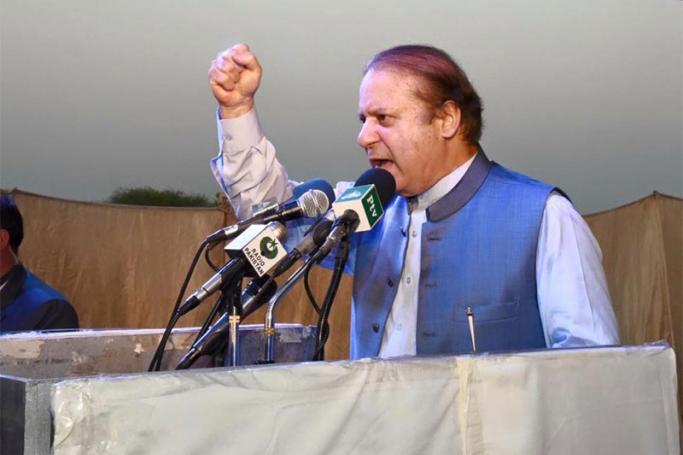Pakistan’s hard-line Islamic parties are piling huge pressure on Islamabad to act tough on the Rohingya issue.
One leading party, Jamaat-e-Islami has asked the Nawaz Sharif government to summon the Myanmar ambassador in Islamabad and lodge a strong protest against the 'systematic ethnic cleansing' of the Rohingya Muslims.
Several other similar parties have supported the move.
Jamaat-e-Islami’s Ameer SirajulHuq, who is a member of the country's Senate, recently appealed to all Islamic countries, especially Saudi Arabia and Pakistan, to push to summon a special session of the UN general assembly to discuss the Rohingya issue.
Huq has asked Prime Minister Nawaz Sharif to send emissaries to all Muslim countries to raise the issue of persecution of Kashmiri Muslims in India and Rohingya Muslims in Myanmar.
Huq has also lashed out at the West and the UN for its ' double standards' in overlooking the Kashmir and Rohingya issues and asked the OIC to step up efforts to protect the Kashmiris in India and the Rohingyas in Myanmar.
"Myanmar is forcing the Rohingyas to renounce Islam, its army is perpetrating horrible atrocities on them, Muslims across the world must react and raise their voice," Huq told Pakistan media recently.
But the Nawaz Sharif government is being cautious because it risks losing out on a contract for selling JF-17 Thunder jet fighters to the Myanmar military.
Myanmar has ordered 16 JF-17 fighters from Pakistan Aeronautical Complex in a half a billion dollar deal.
The JF-17 Thunder jet was designed and developed by Chinese state-run Aviation Industry Corp of China to meet the Pakistani requirement for lightweight and affordable supersonic fighter jet.
They are currently produced for the Pakistani Air Force by Pakistan Aeronautical Complex (PAC), a major aerospace, defence and aviation contractor in northern Punjab near Islamabad producing aircraft and aviation systems for both military and civilian use.
The company produced a total of 16 new generation JF-17 Block-II Thunder aircraft in 2015.
The contract between PAC and Myanmar was signed at the Paris Air Show in June last year, but at that time the manufacturer did not disclose to which country it will be selling the aircraft.
Meanwhile, it has been confirmed by PAC that the first jets are to be delivered to Myanmar starting from 2017.
"That deal has not so far been affected despite Pakistan's strident pitch on the Rohingya issue and the involvement of its Islamist hardline groups with Rohingya militancy," says Myanmar-watcher Mrinal Chakma.
Myanmar President Htin Kyaw has in a recent statement blamed a little-known Rohingya militant group “Aqa Mul Mujahideen” for the recent attacks on Myanmar border outposts, whose leader is supposed to have been trained in Pakistan.
AMM is a new armed group that originated from the Harkat-ul-Jihad Islami-Arakan (HUJI-A) which enjoys close relations with the Pakistan Taliban.
The HUJI-A chief is Abdus Qadoos Burmi, a Pakistani national of Rohingya origin, who it is claimed recruited Hafiz Tohar, 45, from Kyauk Pyin Seik village in Maungdaw in Myanmar and arranged for his training in Pakistan.
Tohar is said to be heading the AMM now and Qadoos Burmi is reported to be close to the Lashkar-e-Tayyaba/Jamaatud Dawa (LeT/JuD), headed by Hafiz Sayeed.
Mizzima had earlier reported the LeT-JuD presence especially that of its humanitarian front Fala- I - Insaniyat in Rohingya relief camps in Rakhine State after the 2012 riots.
Qadoos Burmi developed the HUJI-A network in Bangladesh, using the remote hills on its border with Myanmar, where coverage by Bangladesh security forces was at best limited.
After training a few promising recruits in Pakistan, they were sent to set up bases on the Bangladesh-Myanmar border, where the new Rohingya recruits were trained in combat techniques and use of explosives.
That was during the 2013-14 phase when Bangladesh police and security forces were busy tackling violent political unrest unleashed in their country by Islamist opposition parties against the ruling Awami League.
Bangladesh intelligence zeroed in on a few such bases but security forces raiding them found they had just been abandoned sometimes by days, sometimes hours, before the raids.
Senior Bangladesh intelligence officials said that in July 2012, Jamaat-ud-Dawa (JuD)/ Lashkar-e-Toiba (LeT) started the Difa-e-Musalman-e-Arakan conference in Pakistan to highlight the Rohingya cause.
"Subsequently, senior JuD operatives, Shahid Mahmood and Nadeem Awan, visited, in August 2012, Bangladesh to establish direct contacts with Rohingya elements based in camps along the Bangladesh-Myanmar border," said a top Bangladesh intelligence official, speaking on condition of anonymity.
Bangladesh Prime Minister Sheikh Hasina has now said her country's soil will not be allowed for terrorist activities because Dhaka is concerned over links between Rohingya militants and Bangladesh's own homegrown Islamist radicals who are working against the present government.
You are viewing the old site.
Please update your bookmark to https://eng.mizzima.com.
Mizzima Weekly Magazine Issue...
14 December 2023
Spring Revolution Daily News f...
13 December 2023
New UK Burma sanctions welcome...
13 December 2023
Spring Revolution Daily News f...
12 December 2023
Spring Revolution Daily News f...
11 December 2023
Spring Revolution Daily News f...
08 December 2023
Spring Revolution Daily News f...
07 December 2023
Diaspora journalists increasin...
07 December 2023
Tatmadaw and Arakan Army are in talks












